David I 'the Saint'
King of Scotland 1124-53 AD
Earl of Huntingdon and Northampton 1113-53 AD
Prince of Cumbria 1113-24 AD
Born: 1085 AD
Died: 24 May 1153 at Carlisle (68yo), bur. Dunfermline Abbey
Father: Malcolm III, King of Scotland
Mother: Margaret (English)
Spouse: Matilda (c1072-c1130) m1113, dau of Waltheof II, earl of Northumberland, and widow of Simon de St Liz, earl of Northampton and Huntingdon
4 Children:
Malcolm, murdered in infancy ~1114
Henry (1114-1152) 38yo (12yo son Malcolm declared king designate)
? (dau)
? (dau)
images ===>> |
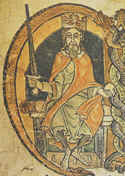
'from a 12C chapter'
MBKQ p403 (d/l) |
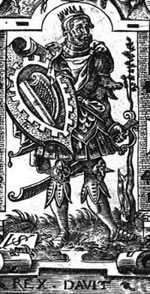
CGKQ p32 (d/l) |
From MBKQ pp403-5:
David was the youngest son of King Malcolm III of Scotland and his English wife Margaret. He was ~40yo when he came to the throne, mature in his character, outlook and ability to govern. He'd spent most of his youth, since 1093 (when both parents died), at the court of Henry I in England, who was his bro-in-law (m. to David's sis Matilda [Edith]). His mother Margaret had instilled in him a deep respect for the church and learning. In 1107 his elder bro Alexander (I) inherited the Scottish throne. Apparently their elder bro Edgar had proposed that Scotland be divided between them, with David to rule the Lowlands S of the river Clyde, but Alexander refused. David threatened to attack, but nothing came of it. It wasn't until 1113, when David m. Matilda, and inherited vast lands in Northumberland, Northampton and Huntingdon, that Alexander relented and allowed David to become sub-king of the Lowlands. Since David also became earl of Huntingdon he was both a Norman baron and a Scottish king, which explains the power he wielded and respect he commanded. When David become King of Scotland in 1124 he consolidated the reforms begun by his mother and brothers. Chief of these was the feudalization of lowland Scotland. Tracts of land were given to Anglo-Norman barons in exchange for their loyalty and service, including to Robert de BRUS, the ancestor of Robert BRUCE, who was given the lordship of Annandale, and Walter Fitzalan, who became High Steward of Scotland and thus the ancestor of the STUART dynasty. Angry highlanders called this 'invasion by invitation' and led at least 2 revolts during David's reign; 1) by Angus, earl of Moray, gson of Lulach [Macbeth's stepson and successor and the 1rst King of Scots known to have been ritually coronated at Scone, k. by Malcolm III <1yr later], in 1130, k. at battle of Strathcarro and 2) by Wimund, bishop of the Isles in 1140. After David's death, the highlander Somerled of Argyll declared his independence from Scotland. Even so, David's gradual reforms brought new cohesian to Scotland. He founded bishoprics at Aberdeen, Brechin, Caithness, Dunblane and Ross and monasteries at Holyrood, Melrose, Kinloss, Newbattle and Dundrennan [and Kelso] and forged strong links to Rome. Tho never formally canonized, he came to be known during his lifetime as a saintly king. It was David who really forged Scotland as a prosperous kingdom, introducing stable currency and developing towns like Berwick, Edinburgh, Jedburgh, Stirling and Perth as major trading centers. He also created the counties which endured til the 1975 reorg. Justice was dispensed by a system of justiciars. In 1127 he recognized Henry I's dau Matilda as heir apparent. At Henry's death in 1135, he invaded N England ostensibly in Matilda's name, brutally occupying the region for 3 yrs. His forces there were defeated by Thurstan, Archbishop of York, at Cowton Moor at the 22 Aug 1138 battle of the Standard. He later settled w/King Stephen, who granted the earldom of Northumberland to David's son Henry. But David switched sides again to support Matilda when she gained the upper hand in Feb 1141, but was thrown back N by Stephen. After that, David remained on the sidelines, in 1149 gaining a promise from Matilda's son Henry II granting lands in N England (but never formalized).
From CGKQ p33:
Ascended throne Apr 1124, reigned 29yrs, 2 sons, 2 dau, he was the last and most able of the sons of Malcolm III. He ruled S Scotland on behalf of his bro Alexander I before his accession. He'd been brought up in England and, after his marriage, was one of the most powerful of English barons. His intervention in the English civil wars of Stephen and Matilda led to his informal acquisition of part of Northumbria. He encouraged the church, learning, trade and urban life, strengthened royal govt during his long and unusually peaceful reign. But royal authority continued to hardly exist in the Scottish Highlands, and the W Isles were still nominally Norwegian.
RP:
This book mentions David in the section on King Stephen of England (formerly 'Stephen of Blois,' a nephew of Wm I and cousin of Wm Rufus and Henry I). Stephen's father had died on Crusade, so Henry I took him in and raised him at his court, arranging his marriage in 1125 to Matilda, "a great continental heiress, only dau of the Count of Boulogne, a spirited woman descended from Charlemagne and the Scottish kings. It must've looked to all the English barons as though King Henry, whose son and heir Wm Audelin [and others] had died in [the 'White Ship' incident in] 1120, was preparing the way for Stephen to succeed him, and indeed Stephen may've assumed this also. But Henry knew the task ... required not only stamina and courage (which Stephen had) but [also] an almost maniacal aggressive toughness and ruthless brutality (which he lacked) ... So he summoned his dau Matilda, his only surviving legitimate child, to his court and forced all his barons to [swear fealty to her, which many resented, i.e. there'd never been a female monarch of England]" (27-8). But, tho Stephen had sworn such fealty 3 times, at Henry's death in 1135 he immediately began plotting to take the throne, which he did with many baron's help on 22 Dec 1135, just a few weeks after Henry's death (one baron, Hugh Bigod, swore on his deathbed that Henry had changed his mind and named Stephen as his successor). Matilda was living in Anjou with her Angevin husband Geoffrey Plantagenet (from whom was named the English 'Angevin' dynasty, i.e. father of 1rst king Henry II) and made no immediate move other than appealing to the Pope. Her main supporters were Geoffrey (Anjou was a rising power), Scots King David and Robert of Gloucester, natural [but apparently illegit] son of Henry I. No Norman wanted to be ruled by a hated Angevin. But Stephen faced immediate challenges by English, Scottish and Welsh barons and responded weakly (as Henry had feared). By 1139 Matilda (now aka 'the Empress') landed in England and began to organize opposition. Civil war ensued (1rst time for England). "By 1141 the area under Stephen's control had greatly diminished" (30) and in Feb his army lost at Lincoln and he was captured (she called herself 'Lady of the English' rather than Queen). But in truth neither ruler was able to dominate England and her army was defeated at London by Stephen's, led by his wife (her haughty manner alienated many). The conflict was in stalemate. Tho Stephen was personally courageous, he lacked ruling authority, and his 19yr reign came to be known for anarchy, when "God and his angels slept" (31) i.e. every baron for himself and wretched conditions (looting, killing, pillaging, kidnapping for ransom, torture) for the peasantry. These "anarchic conditions lasted for years, w/very limited authority exercised by Stephen in the E, Matilda in the W and the Scots king David in the N ... It was as if [Stephen] were too noble a character to inspire fear, and command obedience" (31-2). One rebelling knight gave up his 5yo son as a hostage, whom Stephen's advisors urged him to catapult into the castle as punishment (i.e. killing the boy), but Stephen refused. That boy, who grew up to be Wm Marshall, would play a prominent role in future [Angevin] reigns! Matilda's son Henry became the next king (Henry II, m. 1152 Eleanor of Aquitaine), after making a treaty w/Stephen (1153 Treaty of Westminster) allowing him to rule til his death in 1154.
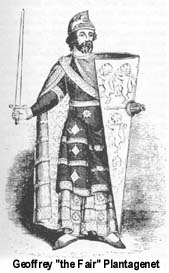
Geoffrey of Anjou (d/l)
(see also CGKQ p127) |
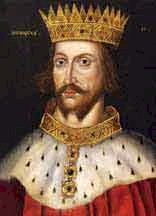
King Henry II (d/l) |
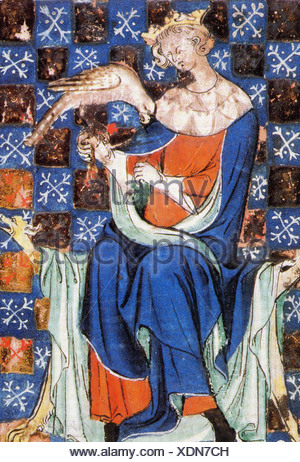
King Stephen I (o/l) |
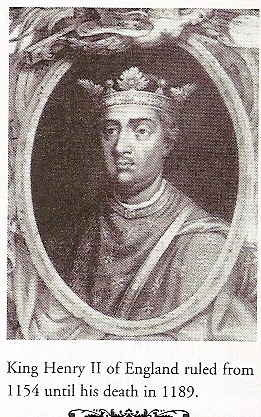
(WM p36) |
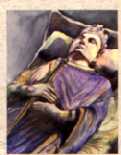
Henry II
Drawing of his effigy at
Fontevrault Abbey, France
(from TWK back cvr) |

(WM p13) |
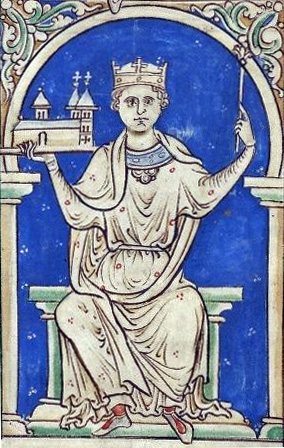
Stephen [of] Blois (o/l)
Here's a list of books relating to this period:
- Nigel Tranter's The Bruce Trilogy (own)
- Nigel Tranter's High Kings and Vikings (own)
- Nigel Tranter's book on David the Saint (SPL?)
- Erik Linklater's The Conquest of England (own)
- ?'s Emma and the Vikings (SPL)
- MacBeth book (title?, own)
Sources:
- MBKQ = Mike Ashley's Mammoth Book of British Kings and Queens (own).
- CGKQ = Kings & Queens, Neil Grant, Collins gem, 1996 (own).
- RP = Royal Panoply, Carolly Erickson, St. Martin's, 2003, FHL.
- WM = William Marshall: Medieval England's Greatest Knight, Myra Weatherly, Morgan Reynolds, 2001, 112pp, FHL.
- TWK = The Welsh Kings, Kari Maund, Tempus, own.










